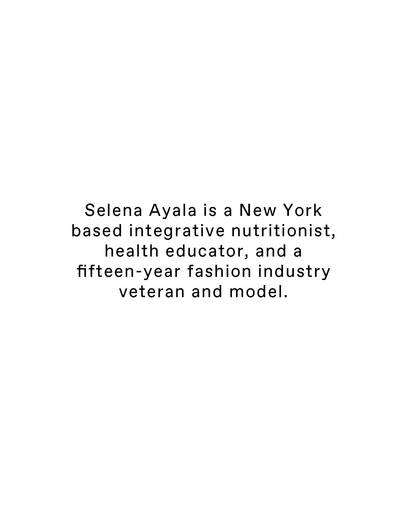Selena Ayala is a New York based integrative nutritionist, health educator, and a fifteen-year fashion industry veteran and model. While working in the fashion industry, she witnessed the brutal, intense ways we relate to our bodies. Soon, she developed a deep interest in integrative nutrition and began to relate to her body in a new way.
Her curiosity pushed her to examine the connection between food and the emotional drivers behind disease in the body. This interest eventually led her to pursue education at the Institute of Holistic Nutrition in Toronto, Canada.
Ayala has also studied in Oaxaca, Mexico, with a Yerberos – a herbalist who relies solely on herbal prescriptions. Thanks to her visibility and advocacy experience, Ayala is working to push our understanding of integrative nutrition and body literacy to empower women and help them thrive in their bodies at every stage of life.
Ayala’s definition of integrative nutrition is not a textbook one; her philosophy blends together traditional wisdom with modern science - defining integrative nutrition as a practice. “I recognise the human body is affected by various internal and external factors such as food, drinks, exercise, emotions, stress, and environment,” she explains. “I find every diet, nutrition, and medical system has its dogma. No one diet, protocol, or medication is right for everyone, all of the time. I encourage the dialogue between the various healing modalities and modern science. I look at all perspectives and establish which conditions should be treated with which healing methods. Whatever our individual preferences in the healing matters, the horizons must be broadened.”
Ayala, guided by the complexities of our relationships with food and its link to mood, developed a ‘food and mood chart’ [see page overleaf], a philosophy around awareness and emotion. “It is based on The Five Phase Theory from Traditional Chinese Medicine (TCM), the law of remedies, the newer science of gut-brain connection, and my personal observation working with clients one-on-one,” she explains. “No longer a new field of study, the science coming out about the relationship between our gut and brain and mood and psychosomatic illness, shows us that what we eat has profound effects on our mood.”
“My chart is a map of possibilities, not fixed or immutable facts. Therefore, everyone who uses the chart must experiment to see where, when, and to what degree these guidelines apply to their personal condition. It will give you a quick and handy overview of what moods may be related to which food excesses or deficiencies. But personally, in my seven years of using the chart, I have seen it work rather consistently. My purpose here is to show how we can continuously use food to rebalance our diets in simple and accessible ways.”
“I find it’s critical to remember any food, remedy, herb, or drug, even if it’s ‘healthy’, can cause, or heal a disorder. Every food philosophy has its dogma, food does not make us healthy, the right kinds of food will allow us to reach our maximum health potential, to become as healthy as our genes and constitution permit, but food does not make us biologically more than we can be,” says Ayala. “The right kind of food will be nourishing without causing stress, and thus allows the immune system to spend its energy doing its thing in a repair, restore and healing cycle. But also, what we don't eat allows us to become healthy again. The more you understand your body and how it functions, the more proactive you can feel in it, and the better decisions you can make about your health.”
When it comes to useful practices, Ayala recommends the ritual of routine. “[Look to] a routine that centres around your health, which could vary from a routine for nutrition, exercise, mental health, body movement, creative practice, sex-wellness,” she shares. “Having a routine is helpful because it is something you do daily and consistently to strengthen your health over time and fosters a relationship and connection to your body - avoid more rigidity in your routines; you should feel good in a routine. The practice of a routine is like a personal how-to guide, the routine being a connection to your body in a unique and meaningful way.”
Another practice, often underutilised, Ayala believes in is checking in with your body via bodily functions, such as going to the bathroom. “This simple act of awareness does wonders to connect with how your body is feeling. For me, I typically try to optimise whatever experience I am currently in, for instance; elimination happens every day, when I sit on the toilet, it’s happening every moment to take a deep breath, release my pelvic floor muscles, and relax in the experience,” she explains.
It’s both these physical and emotional check points that allow us to conjure self-awareness and understanding of how we’re feeling, to provide insight into our health.
As for Ayala’s biggest lessons in looking after oneself, both physically and mentally? “For me, change is the secret to a successful life - the ability to adapt to new circumstances.”




